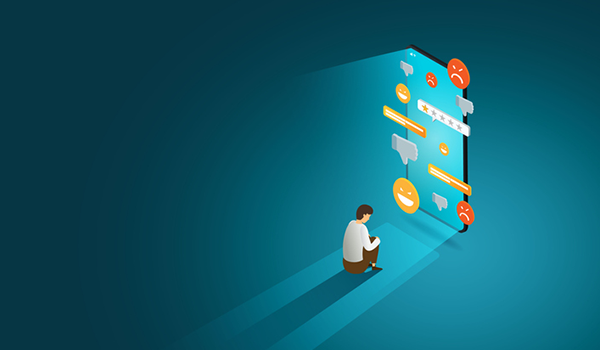Social Media’s Impact on Your Child’s Mental Health
 Over the past several years there has been a rapid increase in children’s screen time. In fact, a recent report found that tweens (kids ages 8-12) spend on average over five hours a day in front of a screen, while teens (kids ages 13-18) spend over eight hours a day. And while screen time does include common kid activities like streaming their favorite television shows, a large portion of many kids’ screen time is dedicated to social media.
Over the past several years there has been a rapid increase in children’s screen time. In fact, a recent report found that tweens (kids ages 8-12) spend on average over five hours a day in front of a screen, while teens (kids ages 13-18) spend over eight hours a day. And while screen time does include common kid activities like streaming their favorite television shows, a large portion of many kids’ screen time is dedicated to social media.
Twitter, TikTok, Instagram, and other social media platforms are where children today go to share their experiences, make new friends, interact with old friends, and just kill time scrolling through their feeds.
But what is all that time online doing to your child’s mental health?
The Negative Side Effects of Social Media
While social media has engraved itself into the everyday lives of many people and looks as though it is here to stay, too much time online may pose many dangers to young minds. Some of the negative side effects include:
-
Cyberbullying: Before the prevalence of social media, children were able to escape their school bullies when they went home. But now, thanks to social media, bullies are able to follow them home right in their pocket. A 2018 survey revealed that 59% of teenagers experience some form of cyberbullying. Cyberbullies can send cruel and hurtful messages that can trigger anxiety, depression, behavioral issues, low self-esteem, or even suicidal thoughts in children.
-
Phone Addiction: The majority of children access their social media accounts through their smartphones. Too much time online can easily turn into a phone addiction, and in fact, a 2020 survey revealed that nearly 50% of teens believe that they are addicted to their smartphones.
-
Anxiety and Depression: Studies have not yet proven that social media causes depression or anxiety, but there are signs that heavy use of social media can increase some of the symptoms of anxiety and depression. Too much time online can increase feelings of loneliness and isolation. The need to keep up and compete can make a child feel anxious. Many kids online may constantly feel the pressure to post perfect photos and videos with perfect captions.
-
Low Self-Esteem: Social media is a highlight reel of a person’s life, meaning most people only post the nicest looking, best experiences they have. Kids online may look at what other people are posting and begin to compare their lives to others. This can potentially lead to feelings of unworthiness, insecurity, self-doubt, and lack of self-confidence.
-
Sleep Problems: Staying up late talking to friends or just scrolling their feed and watching YouTube, unmonitored social media use can impact a child’s sleeping pattern and sleep quality. Lack of sleep may lead to poor grades and poor moods. With a continued lack of sleep, there is also an increased risk for anxiety and depression.
Signs Social Media May Be Impacting Your Child’s Mental Health
It can often be tough to figure out whether or not your child’s mental health is being impacted by their social media use, but there are warning signs you can keep an eye out for! Watch out for things like:
-
Neglecting their Friends: When a child is spending too much time online they may begin to detach from the outside world. Rather than spending time face to face with real friends, your child may begin to favor staying online.
-
Lack of Interest: If your child begins to lose interest in other activities they once enjoyed and instead begins spending more time on social media or on their phones, this could be a red flag that their mental health is being affected.
-
Poor Sleep: If your child is often tired, lethargic, or unusually grumpy, that may be a sign that they aren’t getting enough sleep. If devices are being left in their room, alerts and notifications may be disrupting their sleep or they may be scrolling their feeds late into the night.
The Positive Side of Social Media
While there are many potential negative side effects of social media, things aren’t all bad. When used correctly and in moderation, there are some positive aspects of social media including:
-
Mobilizing Causes: Your child can use social media to organize and even participate in causes and movements they care about.
-
Creativity: Whether learning a new dance, taking an amazing photo, or making a cool video, social media provides a platform and an outlet for your child’s creative expression.
-
Friendship: Social media not only provides a place for children to stay in contact with their current friends; it provides a place for children to meet new people with similar interests. It also provides them a space to learn new things and be exposed to people with different points of view.
-
Community: Through social media, kids can learn about different ways to get involved or volunteer within their community.
How You Can Help
Don’t panic! Whether you’re worried your child may begin to feel the negative side effects of social media or you already see red flags, there are things you can do to help and prevent the negative impact of social media on their mental health.
- As a family, you can practice device-free time. Pick a time or times throughout the day or week when everyone in the family turns off their devices and focuses on one-on-one time.
- To ensure your child gets a good night's sleep, you can remove electronic devices from their rooms at night.
- Get your child involved in activities like a sports team or volunteering for a local organization. Keeping your child busy will help keep them off their devices.
- Talk to your child about social media and how to use it. Keep an open dialogue about what they see online and what they are sharing online. Make sure to educate your child about what is and isn’t appropriate and if you use social media yourself, be sure you are setting a good example.
Monitor and Limit Your Child’s Social Media Use With ExperienceIQ
 Monitoring and limiting your child’s screen time is a great way to limit the negative impacts of social media on your child’s mental health. With GVTC’s ExperienceIQ you can create different profiles for members of your family, set up content filters to prevent your child from accessing inappropriate content, set screen time limits for each profile, and view your child’s network usage (see exactly where they have been spending their time online).
Monitoring and limiting your child’s screen time is a great way to limit the negative impacts of social media on your child’s mental health. With GVTC’s ExperienceIQ you can create different profiles for members of your family, set up content filters to prevent your child from accessing inappropriate content, set screen time limits for each profile, and view your child’s network usage (see exactly where they have been spending their time online).
ExperienceIQ is an enhanced parental control feature available to GVTC Premium WiFi subscribers for an additional $3.95 per month. For a limited time, we are offering a 30-day free trial of ExperienceIQ to all Premium Wifi customers! Click here for more details.
Click here to learn more about GVTC’s Premium WiFi and ExperienceIQ.


